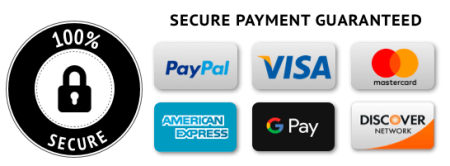Ace Your Project Management Job Interview and Land Your Dream Job
The Underdog’s Guide to Project Management Interviews helps you deliver a strong and authentic performance that screams professionalism
You finally land an interview for a project management position you are excited about.
You are THRILLED.
How cool is that?
Now you want to make sure you won’t screw this up.
Because this could be your chance to can get you out of your boring hamster-wheel job and provide you with exciting new opportunities.
You really put in effort to make sure the interview goes well.
You brainstorm potential questions you might get asked, and you note down the kind of answers that would make sense.
May be you even get new clothes to ensure you leave a great impression.
“Fake it till you make it”, as they say
With excitement and a bit of fear, you await the interview.
And then…
Interview Day!
Counting ….
15 minutes
10 minutes
5 minutes.
You got sweaty palms,
You probably paid more visits to the bathroom in the past 60 minutes than in the last 60 days.
Haha, we all know what interviews feel like, right?
Finally, the interview starts.
“Welcome”
The hiring manager, joined by a team member or an HR person welcomes you with a big grin and immediately starts firing questions at you.
“Tell us a bit about yourself”
“What made you apply for the job?”
“Why do you want to work for _____?”
“Why do you want to leave your current company?”
Tough questions.
After a general discussion, the interview focuses on the position. What your responsibilities would be if you were hired. Who you would collaborate with. What makes the job challenging and what the ideal candidate should bring in terms of skills and experience.
“Why do you think you are a good fit for this position?”
You give a decent but generic answer as to why you think you are a good fit.
You feel it’s an okay answer, but it’s not compelling.
Any other candidate would have probably given a similar answer.
‘Let’s just get through this interview …’
Thank God, you are almost done.
But before you are being released, the manager still has one question for you.
It’s the one question most candidates hate and SUCK AT answering because mentally, they are already out of the door and gone:
“Do you have any further questions?”
Are you going to take the easy way out and respond with ‘No, all good’?
Hopefully, you don’t, because this question is really an opportunity for you to stand out from the other candidates.
Well, at least you made it through the interview without totally embarrassing yourself.
A few days pass.
Finally, you hear back from the company, and your heart drops:
Dear applicant,
We regret to inform you that we could not consider you for the position of a ___ PM__
We wish you all the best for your career
Sincerely
Recruiter Name
*Gulp*
You can feel the disappointment in your gut.
Not just because you didn’t get the job.
You feel the interview went pretty well.
You didn’t say anything stupid.
It was a smooth and lively conversation and there was no awkward moment.
There was also no indication that you didn’t have any of the demanded skills.
So why did you not get the job?
You don’t know, because you are not getting any feedback!
If only you got some feedback like “Okay, what is it that I could improve on or is there some reason where I’m lacking to get this a job.”
But no, that’s it.
Without any specific feedback about where you can improve, you’ll walk into the next interview with just the same mindset, the same level of preparation and the same standard answers.
And the result will probably be …. let’s be frank … the same:
You won’t get to the next round, and you won’t get the job.
You and I know that’s not the most effective way to go about interviewing.
Think about it:
You are not just looking for ANY job.
You want to get into your dream job. One that can transform your life, give you more status, more responsibility, more perks, higher pay, the envy of your peers, instagramm-able vacations.
What are the chances of getting the job if you don’t change your approach to interviewing?
If you just keep performing at the same level
Isn’t that like gambling? Hoping that one day, after 203 intense interviews, you will magically be accepted into the “Project Manager Hall of Fame”
You can do better, I know for sure.
With a bit of extra preparation …
- you could go into an interview more relaxed and with much greater confidence
- you could leave a much better impression
- you could provide higher-quality answers to standard interview questions
- you could double your “leadership charisma” and instantly be regarded as a leader-type
- you could leverage your unique background and personality to stand out
- most importantly: you could persuade the hiring manager that you are the real deal, the one who could do the job
What I’m telling you here isn’t just my opinion.
It’s not theory.
It’s all coming from my own experience, because I managed to pull myself out of a boring technical job into project management, and from there gradually got myself into higher level PM roles with more and more responsibility and ultimately become one of the most respected Project Managers in the company.
And to be honest:
The odds were not all stacked in my favor.
I didn’t have any role models in my family who had made a corporate career.
I didn’t go to a famous school.
I had good grades but I wasn’t a top student.
I’m not the 6-foot Dolph Lundgren type who everyone automatically accepts as a leader.
I don’t have the low, powerful voice of Henry Kissinger where everybody drops their pencil and starts listening.
I had to *earn* my way into the project management rack that would eventually make me an accepted leader in the company.
And by *earning* I don’t mean just doing a great job.
I consistently improved my skills
Not just the hard skills but also my soft skills
I spent a lot of time talking to hiring managers and recruiters to better understand what companies were really looking for in a good project manager.
I read books on body language to better understand the unconscious signals I was sending at work but also during an interview.
I watched videos about fashion because I wanted to learn how to dress better, because we all know about the impact of clothing style on how you are being perceived.
In a nutshell, I did everything I could possibly do to boost my success in job interviews and to land my next-level dream job.
And you know what?
I almost ALWAYS got an offer — even though I didn’t meet all the requirements from the job description
What I’m trying to get across here is that:
After your next project management job interview, you could be in your dream position
Whatever that would be for you.
Project Manager
Senior Project Manager
You name it.
It’s possible. It’s not rocket science.
If I’ve been able to break the shackles of my boring job and embark on an amazing career as a project manager ….
…. you can do it too.
To help you get your foot into the door of the best companies, and to help you master your next job interview and finally get the top job you want, I’ve created a special resource for you.
The Underdog’s Guide to Project Manager Interviews
Ace the project manager interview and land your dream job
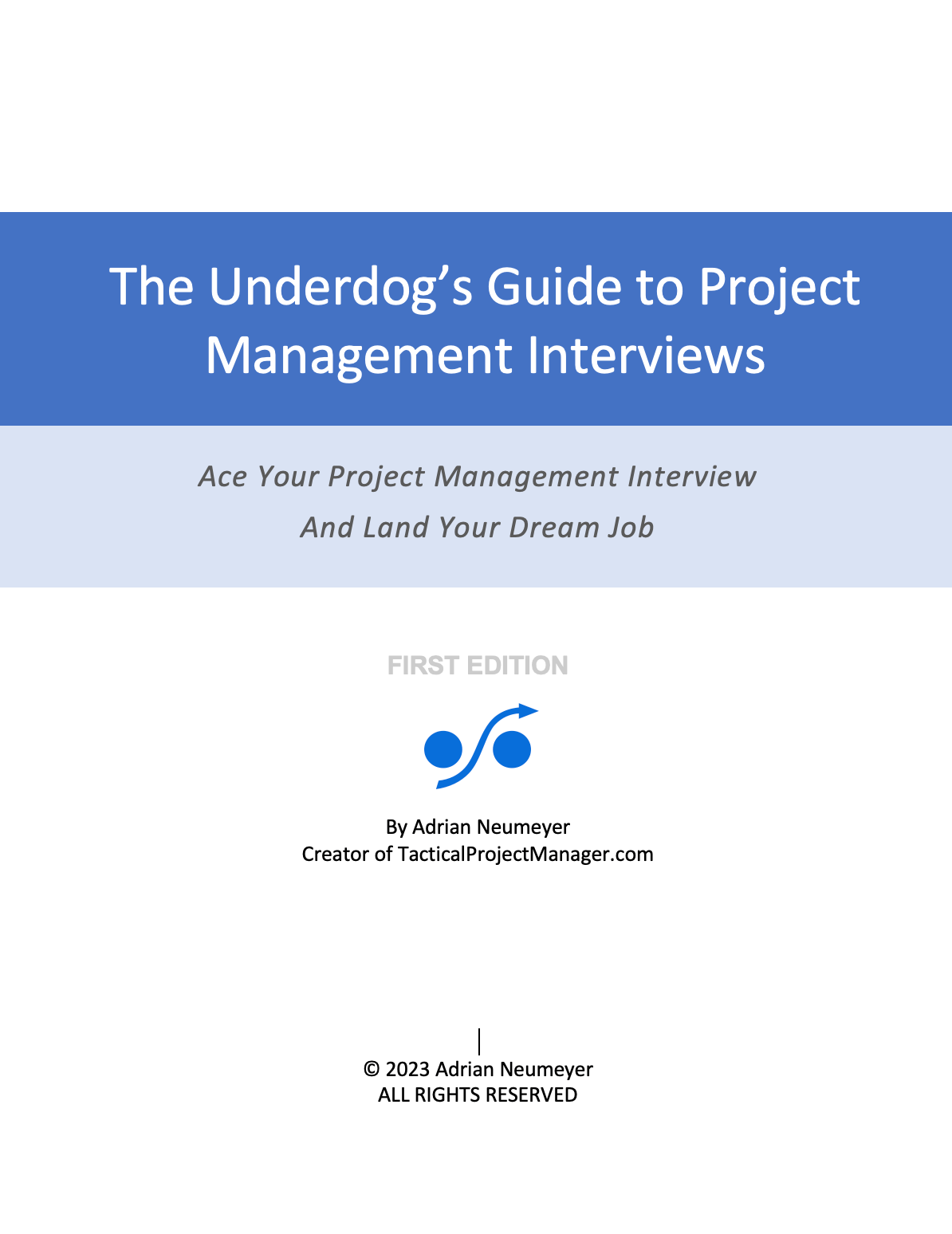
This 50+-page interview guide will help you get perfectly prepped for your job interview for a project management role (project manager, senior project manager, project coordinator and the like).
This is not the typical job interview guide you can buy on Amazon, written by some PhD who was born with a silver spoon in his mouth and made it into an Ivy league school and top jobs through family connections – and now thinks they can teach the average Joe or Jane how to can be successful.
This guide is for the ambitious underdog, people with an INSANE appetite for growth and success, people who are willing to put in the hard work, the hours, people who are willing to make sacrifices and who are fine with earning their way up into a top role, and people who let their results speak, not their connections. People who want to transform themselves and rewrite their story, and catapult themselves ahead of everybody else. Is that you? If yes, read on.
For the Interview Guide, I poured in every bit I’ve learned about getting an application through the door and succeeding at the job interview. You will learn the exact techniques I have used to land top jobs in project management and other areas that almost seem out of reach.
One more thing: In my career, I have also worked on the “other side”: I have hired people at various levels and sifted through hundreds of applications. This puts me in a unique position because I know how hiring decisions are made, what makes some resumes stand out, and why certain people make it into top jobs and others don’t.
The Underdog's Guide to Project Management Interviews
What you will find in the guide
Chapter 1: Selecting Candidates: A Hiring Manager’s Perspective
Back in the days when I was in charge of selecting and interviewing candidates for project management positions, I dedicated no more than 15 minutes to reviewing applications every day. I just didn’t have more time!
In this chapter, I’ll take you on a behind-the-scenes look at how managers check resumes and decide which candidates to invite for an interview.
You’ll learn what specific elements in your application will draw the attention of the hiring manager and what specific qualities will set you apart from other candidates.
REMEMBER: You only have 6 seconds to make an impression!
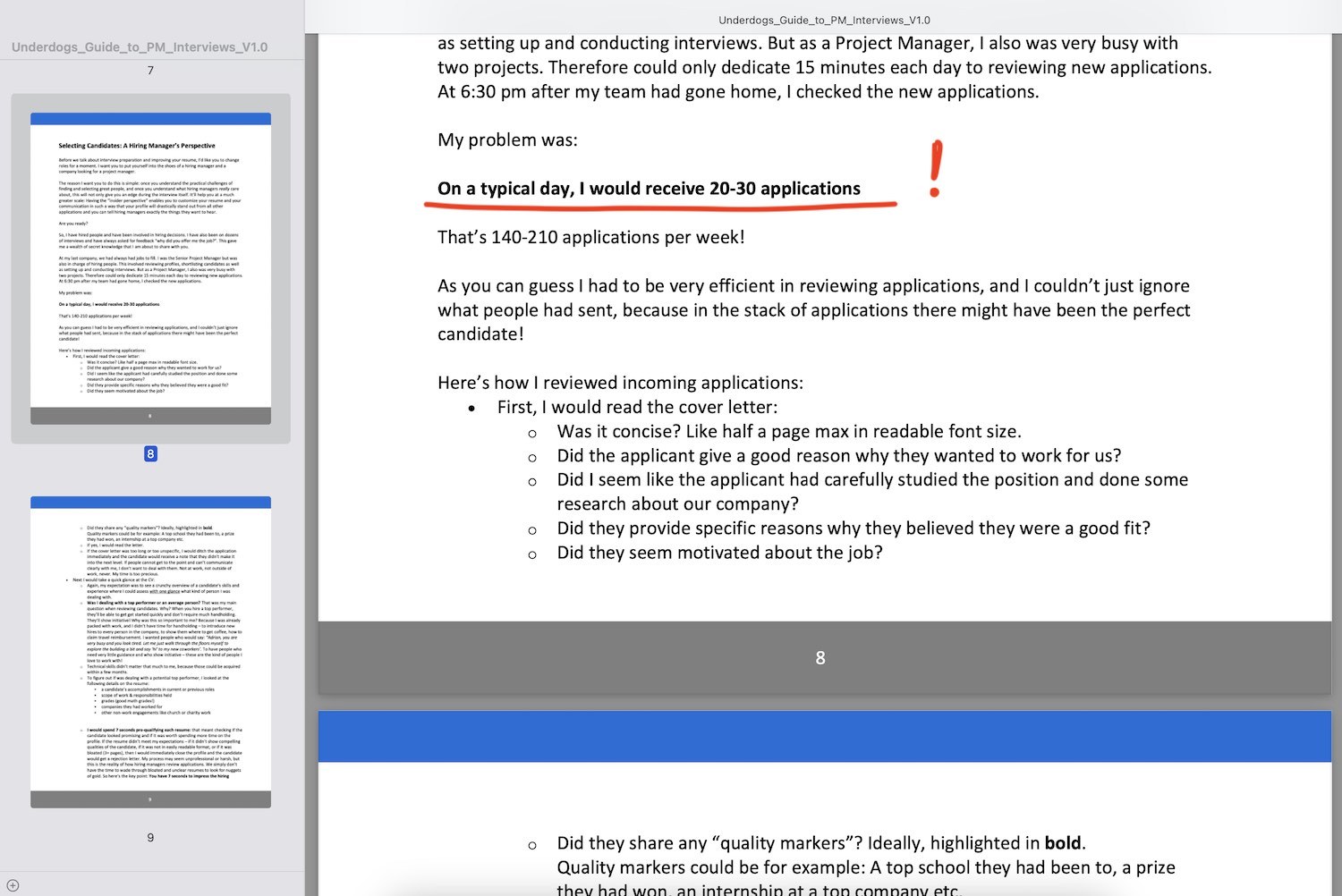
Chapter 2: How to Appear Like a Leader During an Interview
You have probably also made the observation that some people feel like natural leaders. They act and talk in a way that makes them stand out from everybody else.
We could do an entire course on how to act more like a leader, but hey … the good news is there are just a few simple behavioral patterns that — once you put them into practice — will significantly change how you are being perceived and you’ll appear more like a leader.
These patterns involve showing proactivity during the interview and body language that exudes confidence.
Just be more conscious about your behavior and the outcome of your next interview can be surprisingly different!
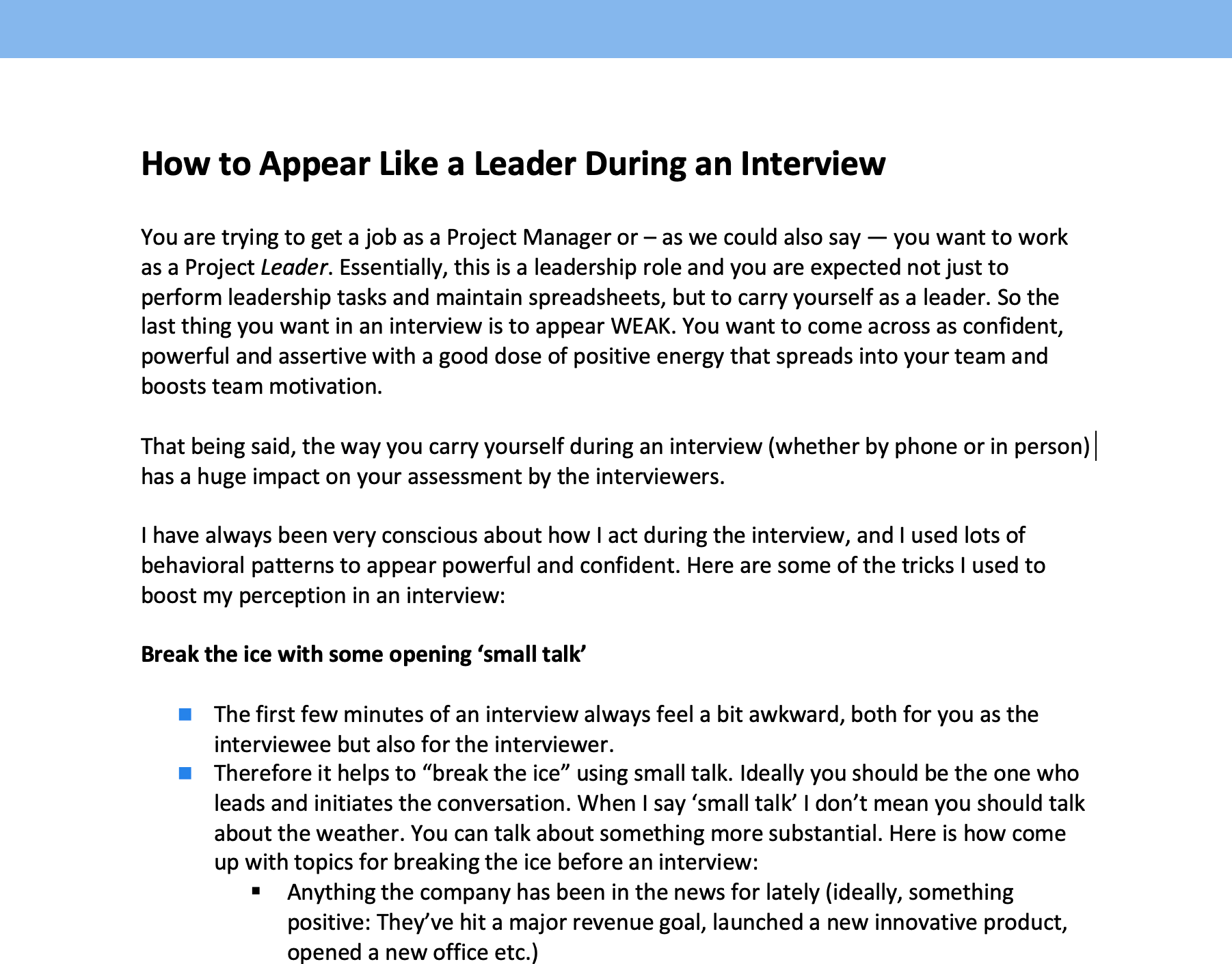
Chapter 3: Interview Questions and Answer Guide
Top interview questions & step-by-step answer guide
We’ll take a detailed look at the 15 most common interview questions being asked during PM interviews, and I’ll help you craft powerful and persuasive answers [adding insights and stories from your own experience].
The questions not only test your understanding of project management methods. They also provide a glimpse of your character and your motivation and ultimately have the biggest impact on your interview success. Needless to say that you need to answer those questions in a smart and strategic way!
For each interview question, I’ll take you through the points you should consider in your response. We’ll touch on project management techniques and best practices where it makes sense. But most importantly, we’ll make sure you project the image of a trusted professional who truly understands his field.
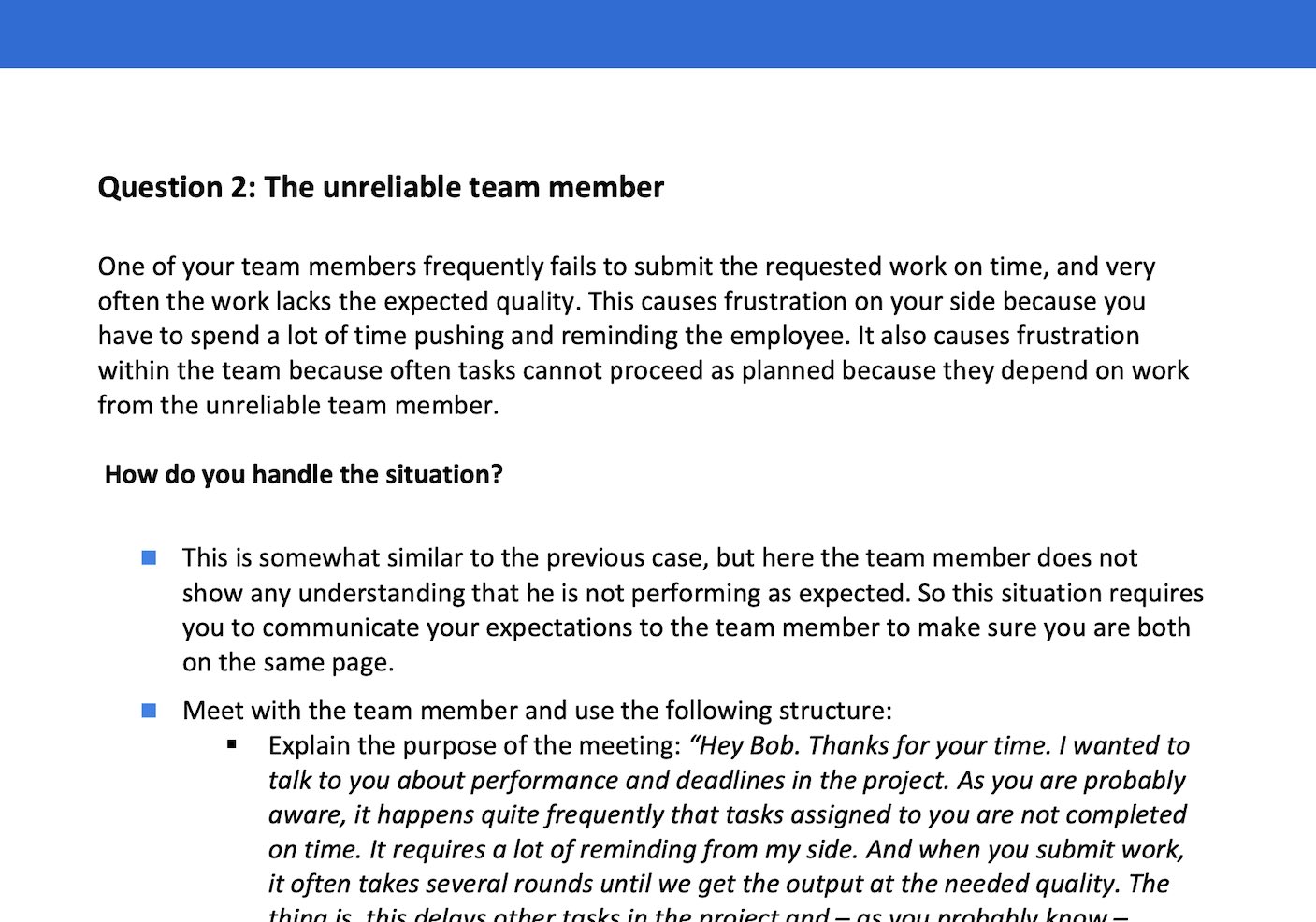
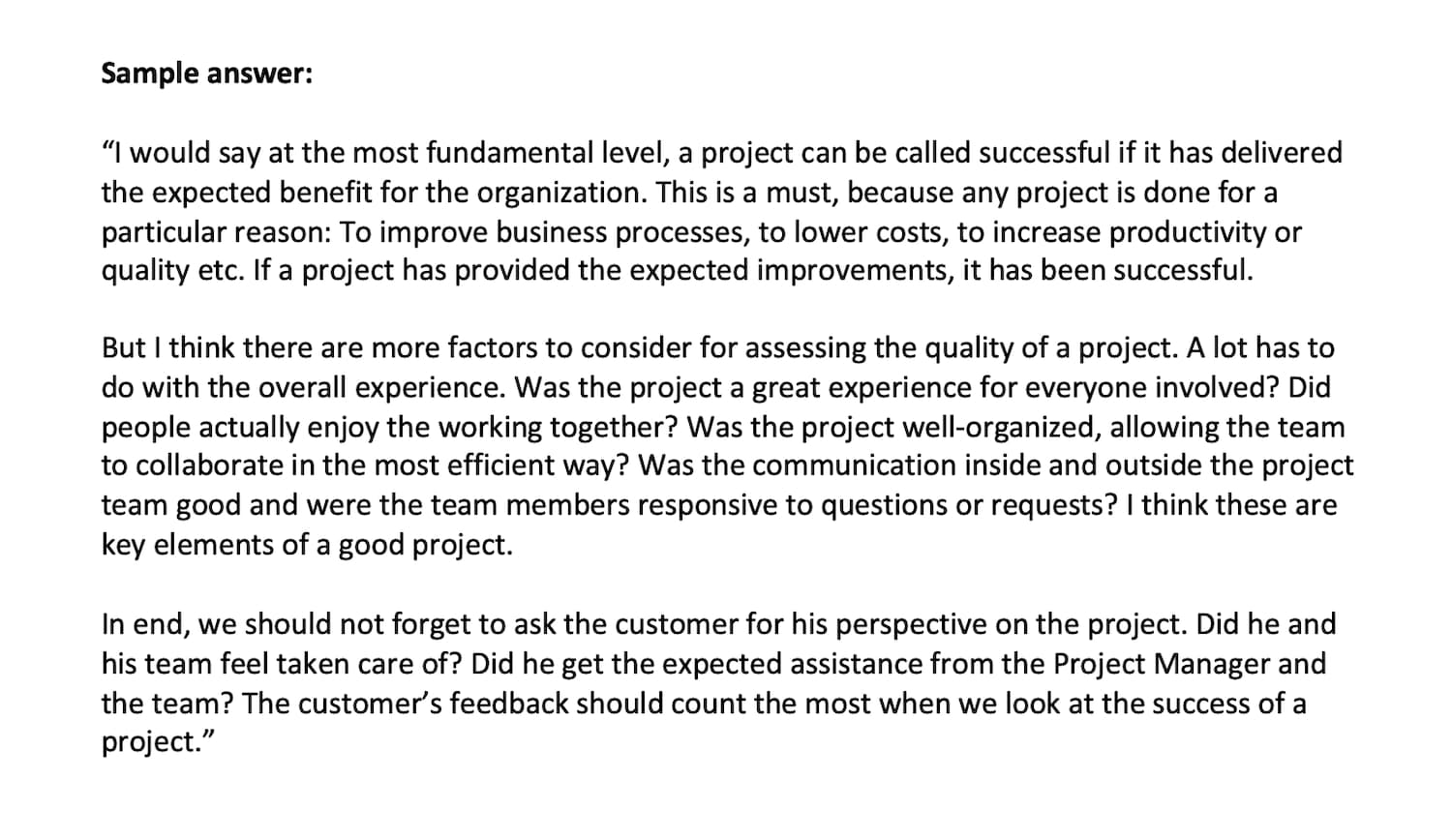
Sample answer to the question: Other than by revenue and time, when do you call a project successful?
Sample answers
For each interview question, you can find a sample answer. Basically, you’ll see how I would answer the questions by weaving in insights and stories from my own projects. There is probably no better way to prepare for your upcoming interview than to study real-life answer examples, and that’s why I included them.
Craft your own answer
Some questions focus on your experience and motivation.
For example:
- Have you ever managed an escalation and what did you learn from it?
- Where do you see yourself in 5 years?
To help you confidently answer those questions as well, I will give you a framework to craft your own answer, using examples from your own work.
Interview questions covered in the guide
Question 1: A team member asks for additional time to complete a task. Do you approve?
Question 2: The unreliable team member
Question 3: What would you do if you were managing a team of 4 engineers and 1 engineer left?
Question 4: What would you do if a request to add 3 more features requests came in while you were working on a project?
Question 5: What is the most important job of a project manager?
Question 6: When do you call a project successful?
Question 7: Why do you want to leave your current employer?
Question 8: How do you motivate a team?
Question 9: Where do you see yourself in five years?
Question 10: Managing an Escalation
Question 11: Explain the team composition for one of your projects
Question 12: Explain the Business Benefits of a Project .
Question 13: How do you deal with a difficult stakeholder?
Question 14: Adjusting the behavior of a team member
Question 15: How do you manage risk in a project?
Resume Makeover: How to Improve Your CV to Increase Acceptance Rates
Creating a compelling resume
My top tips for transforming a standard resume into a compelling testimonial of your skills and successes. A document that captures the attention of recruiters and hiring managers.
You’ll also learn how to easily customize your resume for the job you’re applying for (the secret to “hacking” the applicant tracking system.
Finally, I also included a sample resume to show you what a compelling and crisp CV looks like.
What customers are saying about the guide


Hi, I'm Adrian Neumeyer

Hi, I’m Adrian Neumeyer, founder and CEO of Tactical Project Manager. I have been working as a Senior IT Project Manager for the past ten years. Today my focus is to help people who manage projects — people like you! — by providing practical tips and time-saving tools. Connect with me on LinkedIn.
No risk for you

My goal is to provide you with the most useful and actionable material to help you land your dream job in project management. If you are not satisfied with your purchase, I am happy to return your investment within 30 days after you placed the order.
Get it now!
The Underdog's Guide to Project Management Interviews

- Top interview questions and what to cover in your answer
- Including sample answers
- Secret tips for increasing the acceptance rates of your CV
- Included: Sample resume
- 50+ pages of in-depth and actionable content you won't find anywhere else
- You’ll get an email with a download link to access the guide
- No unwanted marketing emails
- Contact form for support and questions
